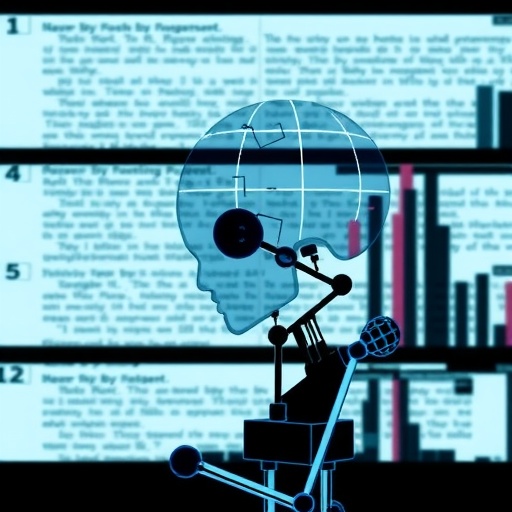In a groundbreaking study published in PeerJ Computer Science, researchers have unveiled critical insights into the inherent challenges posed by artificial intelligence-driven text detection tools. These systems are increasingly employed to differentiate between human-written content and that generated by AI. However, as this study elucidates, their implementation is not without significant drawbacks, particularly for non-native English speakers and various academic disciplines. The findings not only expose systemic biases but also highlight the pressing need for ethical frameworks surrounding the use of such technologies in scholarly publishing.
Leading the charge in this investigation were researchers dedicated to understanding the implications of AI tools on academic integrity. The compelling research paper, titled "The Accuracy-Bias Trade-Offs in AI Text Detection Tools and Their Impact on Fairness in Scholarly Publication," examines the intricacies involved in AI content detection, revealing a complex interplay of accuracy and bias that has far-reaching consequences for authors. This examination is especially timely as reliance on AI tools continues to grow in academic environments, raising concerns about equity and fairness in evaluation processes.
The first major finding of the study indicates that popular AI detection tools, such as GPTZero, ZeroGPT, and DetectGPT, possess inconsistent accuracy rates. These tools are designed to discern between human-generated academic abstracts and those crafted by AI, but their performance varies widely. Such inconsistencies may lead to a systematic mislabeling of academic work, potentially undermining the integrity of the publishing process. This raises significant questions regarding which criteria these systems should prioritize in their assessments.
Another noteworthy insight from the research pertains to the phenomenon of AI-assisted writing. While language models can enhance human text to improve clarity and readability, their effects complicate the detection landscape. This presents unique challenges for detection algorithms, which often lack the sophistication to accurately gauge the nuances of AI-enhanced content. The overlap of human creativity with AI assistance creates a grey area that detection tools struggle to navigate, further exacerbating the issue of reliability.
Highlighting the irony of technological advancement, the study points out that higher accuracy in detection tools does not necessarily equate to fairness for all authors. In fact, the most accurate tool assessed in the research exhibited the strongest bias against certain groups, specifically targeting non-native English speakers and underserved academic disciplines. The bias inherent in these systems raises profound ethical questions about who gets validated and whose voices might be marginalized in the academic landscape.
In particular, non-native English speakers are finding themselves at a distinct disadvantage. The research indicates that their work is often misclassified as entirely AI-generated, resulting in false positives that could deter scholars from pursuing publication opportunities. This is not merely an academic concern; it carries significant implications for equity in the distribution of knowledge and representation in scholarly discourse. The message sent to these authors is stark—despite their expertise and unique contributions, their work may be unjustly scrutinized or dismissed due to a flawed evaluation process.
The research team emphasizes the urgent need to pivot away from over-reliance on purely detection-based approaches. They advocate for a more responsible, transparent use of large language models (LLMs) in academic publishing. This involves creating frameworks that prioritize inclusivity, ensuring that technological advancements do not reinforce existing disparities. Such a shift is crucial for safeguarding the integrity of scholarly communication and expanding opportunities for diverse authors.
Ultimately, this study serves as a clarion call to the academic community. It challenges scholars and publishers to reevaluate their engagement with AI tools, prompting critical discussions about best practices and ethical considerations in the realm of publishing. As the landscape shifts, maintaining a vigilant eye on the implications of AI on fairness and access remains imperative.
Efforts to understand the impact of AI technologies on academic integrity must be ongoing, involving a multi-faceted approach that considers not just detection accuracy but the broader context of who is affected and how. This dialogue is vital for fostering an environment that nurtures creativity and innovation while upholding the highest standards of fairness and equity in publishing.
As researchers conclude their findings, they remind us that technological progress must not outpace our commitment to ethical considerations. The stakes are higher than ever as we navigate this rapidly evolving terrain. The implications of these developments in AI text detection tools will resonate throughout the academic world, calling for a concerted effort to safeguard the integrity and inclusivity of scholarly publishing for all.
The need for supportive measures to enhance the accessibility of academic publishing is increasingly evident. Without intervention, the biases present in AI detection systems may perpetuate a cycle of exclusion, limiting the diversity of thought and talent that characterizes meaningful scholarly work. The research highlights that the responsibility lies not just with technology developers but also with academic institutions and publishers to ensure fair representation.
In conclusion, the study published in PeerJ Computer Science provides a comprehensive analysis of the accuracy-bias trade-offs inherent in AI text detection tools. As the academic landscape continues to evolve with the integration of AI, addressing these challenges and ensuring equitable access to publishing opportunities is paramount. By fostering an ethical framework around AI use in scholarly publishing, we can strive for a future where innovation complements inclusivity, empowering authors from all backgrounds to share their insights freely and fairly.
Subject of Research: AI text detection tools and their biases
Article Title: The Accuracy-Bias Trade-Offs in AI Text Detection Tools and Their Impact on Fairness in Scholarly Publication
News Publication Date: 23-Jun-2025
Web References: DOI Link
References: N/A
Image Credits: N/A
Keywords
AI text detection, academic publishing, fairness, non-native speakers, biases, technology ethics




